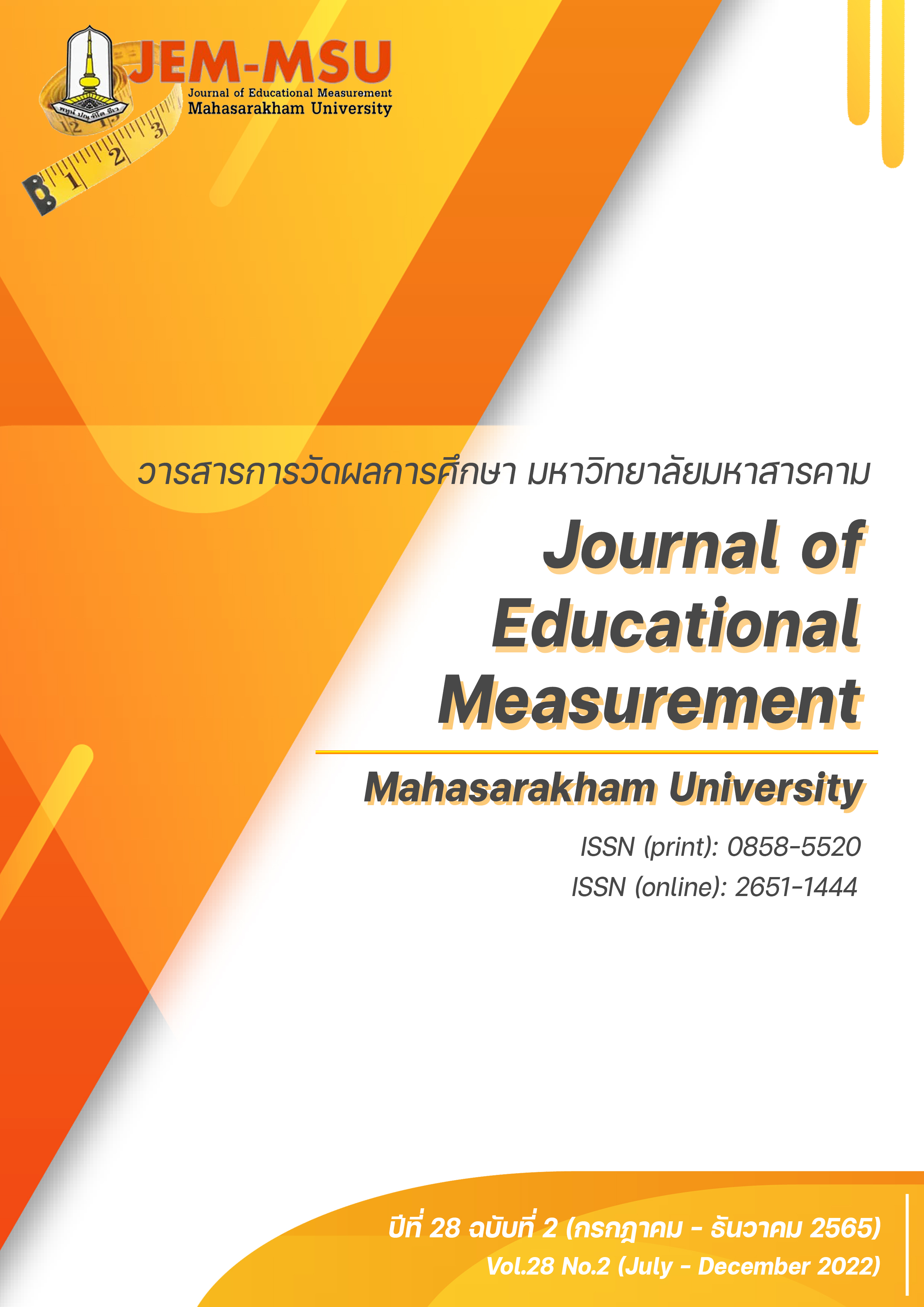แบบวัดคุณลักษณะทางจิตวิทยา
Main Article Content
บทคัดย่อ
แบบวัดคุณลักษณะทางจิตวิทยาเป็นเครื่องมือที่ใช้วัดคุณลักษณะภายในของบุคคลที่เป็นนามธรรมและเป็นการวัดทางอ้อม ดังที่ ลอร์ดและโนวิค (Lord & Novick, 1958) และทอร์เกอร์สัน (Torgerson,1958) ได้ให้ความหมายของการวัดว่าเป็นกระบวนการที่กำหนดค่าให้แก่คุณลักษณะหรือคุณลักษณะของสิ่งของหรือเหตุการณ์ ดังนั้น ผู้ที่จะทำการวัดจึงจำเป็นที่จะต้องพัฒนาเครื่องมือวัดหรือแบบวัดให้มีคุณภาพ เพื่อให้ได้ผลการวัดที่น่าเชื่อถือ บทความฉบับนี้มีวัตถุประสงค์เพื่อนำเสนอเนื้อหาเกี่ยวกับแนวคิดการวัดคุณลักษณะภายในบุคคล ประเภทของแบบวัดทางจิตวิทยารูปแบบต่างๆ การพัฒนาแบบวัดทางจิตวิทยาแต่ละชนิดที่มีกระบวนการและวิธีการนำไปใช้ที่แตกต่างกัน เช่น แบบเทอร์สโตนใช้วัดคุณลักษะเพียงอย่างเดียวโดยบ่งชี้ความมากน้อยของคุณลักษณะหรือตัวแปรที่ต้องการจะวัดในรูปแบบของคะแนนต่อเนื่อง แบบกัตต์แมนเป็นแบบวัดที่เน้นการวัดทัศนคติแต่ละด้านของคนแล้วนำข้อมูลที่สำรวจได้มารวมกันทั้งหมด ทำให้เราทราบความคิดเห็นของคนต่อสิ่งนั้นเป็นภาพรวมทุกด้าน แบบลิเคิร์ตเป็นแบบวัดที่มีรูปแบบของข้อคำถามสามารถเป็นไปได้ทั้งข้อคำถามทางบวกหรือทางลบเพื่อวัดเกี่ยวกับความรู้สึกของผู้ตอบต่อเป้าหมายการวัด ส่วนแบบออสกูด เป็นรูปแบบแนวคิดทางการวัดเกี่ยวกับความหมายของสิ่งที่ต้องการวัดอย่างหลากหลาย โดยใช้ความหมายทางภาษาเป็นมาตรวัดที่ใช้จะอยู่ในรูปของคำคุณศัพท์ เพราะเป็นคำที่สามารถใช้ได้ทั้งทางบวก และทางลบ ตลอดจนถึงวิธีการสร้างและหาคุณภาพของแบบวัดคุณลักษณะทางจิตวิทยา และการวัดคุณลักษณะทางจิตวิทยาในยุค New Normal
Article Details

อนุญาตภายใต้เงื่อนไข Creative Commons Attribution-NonCommercial-NoDerivatives 4.0 International License.
เนื้อหาและข้อมูลในบทความที่ลงตีพิมพ์ในวารสารการวัดผลการศึกษา มหาวิทยาลัยมหาสารคาม ถือเป็นข้อคิดเห็นและความรับผิดชอบของผู้เขียนบทความโดยตรง ซึ่งกองบรรณาธิการวารสาร ไม่จำเป็นต้องเห็นด้วย หรือร่วมรับผิดชอบใดๆ
บทความ ข้อมูล เนื้อหา รูปภาพ ฯลฯ ที่ได้รับการตีพิมพ์ในวารสารการวัดผลการศึกษา มหาวิทยาลัยมหาสารคาม ถือเป็นลิขสิทธิ์ของวารสารการวัดผลการศึกษา มหาวิทยาลัยมหาสารคาม หากบุคคลหรือหน่วยงานใดต้องการนำทั้งหมดหรือส่วนใดส่วนหนึ่งไปเผยแพร่ต่อหรือกระทำการใดๆ จะต้องได้รับอนุญาตเป็นลายลักษณ์อักษรจากวารสารการวัดผลการศึกษา มหาวิทยาลัยมหาสารคาม ก่อนเท่านั้น
เอกสารอ้างอิง
Barak, A. (2011). Internet-based psychological testing and assessment. In R. Kraus, J. S. Zack, &
Speyer, C. (Eds.), Online counseling: A handbook for mental health professionals. 2nd Ed. (pp. 225-255). Elsevier Science.
Butler, J., & Kern, M. L. (2016). The PERMA-Profiler: A brief multidimensional measure of flourishing. International Journal of Wellbeing, 6(3), 1-48.
Groth-Marnat, G. (2009). Handbook of psychological assessment (5th ed). Wiley.
Kidder LH, Judd C, Eliot R. (1986). Research methods in social relations. Holt, Rinehart & Winston.
Lord, Frederic M. and Novick, Melvin R. (1958). Statistical Theories of Mental Test Scores. Addison-Wesley.
Maheu, M. M., & Gordon, B. L. (2000). Counseling and therapy on the Internet. Professional Psychology: Research and Practice, 31,484–489.
Naus, M. J., Philipp, L. M., & Samsi,M. (2009). From paper to pixels: A comparison of paper and computer formats in psychological assessment. Computers in Human Behavior, 25(1). 1-7.
McLellan, L.F., Kangas, M., Rapee, R. M., Iverach, L., Wuthrich, V. M., Hudson, J. L. & Lyneham, H. J. (2020). The Youth Online Diagnostic Assessment (YODA): Validity of a New Tool to Assess Anxiety Disorders in Youth. Child Psychiatry & Human Development, 52, 270–280.
Miller, E. T., Neal, D. J., Roberts, L. J., Baer, J. S., Cressler, S. O., & Metrik, J., et al. (2002). Test-retest reliability of alcohol measures: Is there a difference between Internet-based assessment and traditional methods?. Psychology of Addictive Behaviors, 16, 56-63.
Pearson. (October, 2021). Wechsler Adult Intelligence Scale - Fourth UK Edition (WAIS-IV UK) – Telepractice and WAIS-IV. https://www.pearsonclinical.co.uk/Psychology/AdultCognitionNeuropsychologyandLanguage/AdultGeneralAbilities/WechslerAdultIntelligenceScale-FourthUKEdition(WAIS-IVUK)/ForThisProduct/telepractice-wais-iv.aspx
Rammstedt, B., Holzinger, B., & Rammsayer, T. (2004) Comparison of paper-and-pencil vs. computerized administration of the NEO-Five Factor Inventory (NEO-FFI). Diagnostica, 50, 88-97
Seligman, M. E. P. (2011). Flourish: A visionary new understanding of happiness and well-being. Free Press.
Torgerson, W. S. (1958). Theory and methods of scaling. John Wiley.
VandenBos, G. R., & Williams, S. (2000). The Internet versus the telephone: What is telehealth, anyway? Professional Psychology: Research and Practice, 31, 490–492.
Kanjanawasee, S. (2001). Measuring and Evaluating Thinking Abilities, Thinking Science. Institute of Academic Development Press. (in Thai).
Laothong, N. (2013). Conducting Educational Research Tools. Chulalongkorn University Press. (in Thai)
Pothisan, P. (2020). Guttman Scaling. Encyclopedia of Education. http://ejournals.swu.ac.th/index.php/ENEDU/article/view/5701/5339. (in Thai)
Saengkaew, P. (1998). Social Science Research (3rd ed.). Thammasat University Press. (in Thai)
Saiyos, L. and Saiyos, A. (1985). Educational Research Principles. Suksaporn Press. (in Thai)
Srisa-ard B. (2013). Basic Research (9th ed.). Suweeriyasan. (in Thai)
Worakham, P. (2019). Educational Research (10th Ed). Taksila Karnpim. (in Thai)


